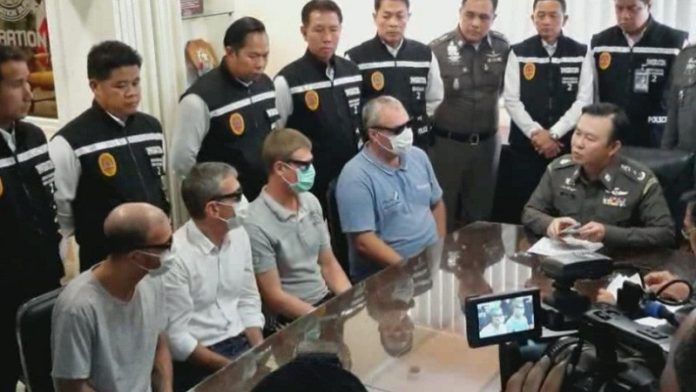Thailand Immigration Controls: getting tough with guests
Many foreigners were shocked by the 25 March 2019 enforcement of the TM30 regulations requiring reporting of the location of stay of foreigners visiting, living or working in Thailand.
Even more will get their shock when they learn of the consequences of failure to report, in most cases knowing nothing about the regulatory enforcement.
The basic rule is that the owner or leaseholder of any premises in Thailand must report the presence of any foreigner who stays overnight at their premises, within 24 hours of the foreigner’s arrival.
Failure to report can mean a fine of Baht 800 to 2,000 against the premises owner or leaseholder (Baht 10,000 if a hotel) along with the refusal by the Immigration Department to process applications for visa or work permit issue or renewals by the foreigner concerned.
Is the Regulation Imposition really so shocking?
The Immigration Department has long had the power and duty to monitor the presence of foreigners in Thailand territory.
Several countries are much stricter than Thailand in this respect, notably Vietnam, which not only monitors where its foreign visitors are staying but also limits their choice of stay location, especially in private homes and non-authorised lodgings for foreigners.
With increasing risks of terrorism, Thailand has come to realize that some foreign criminals have been able to make extended stays in-country, often renting houses or apartments for long-term stays.
Who must be reported by TM30?
Theoretically, all foreigners are required to be reported within 24 hours of arrival at premises in Thailand. However, at the present time, there are some exceptions.
Required to be reported are the following:
All registered hotels have routinely reported their guests within 24 hours of arrival, with copies of passports and personal details;
Foreigners staying at private houses, condominiums and private apartments that are not hotels, have been escaping registration. These establishments welcome guests, without reporting either to Immigration or to the Revenue Department. Both organizations are seeking to crack down on such evasions, so as to be able to collect data but also tax on income received. Registration is now required on each entry into Thailand;
Retirees on annual retirement visas, researchers and students on relevant visas are all required to be registered each time they enter Thailand;
Work permit holders must be registered on each arrival in Thailand and will need to present their TM30 registration receipts as part of their work permit applications, approvals, and renewals.
Who need not be reported?
There are some exceptions to the registration requirements, although these may become subject to modification and therefore need to be monitored in order to avoid becoming liable to fines for late or non-registration.
These exceptions include:
Permanent residents of Thailand are not required to be registered either on their arrivals or under the Standard 90-day reporting process. The permanent residence used to be a regular process for those staying for extended periods in Thailand. Approvals for permanent residence are nowadays becoming rare privileges;
Those with diplomatic status are already registered and closely monitored by the relevant authorities. Some live on diplomatic premises while others stay in alternative accommodation but are already duly registered. The same applies to international civil servants and visiting official technical experts;
Special categories of work permit holders are also reported to be exempt from registration. These individuals are those whose work permits are handled by the “One-Stop Service Center” at Chamchuri Square, designed for Board of Investment privilege holders; Smart visa holders, and also some companies with large capitalization.
This is a somewhat opaque category of registration exemption. If one can gain admission to this exclusive club, one can save a lot of trouble to one’s landlord, but the latter will need more than word-of-mouth reassurance that there is no need to register and therefore avoid fines;
Foreign personal owners of property titles have also been reported to be exempt. Since foreigners are not allowed to own land title deeds, these property owners will be condominium owners (not leaseholders). Such foreign individuals will already be registered on house registration books (“tabien bahn”) and mostly be holders of retirement visas, or stay permits linked to work permits. Some foreigners have acquired condominiums in the name of a spouse or partner, in which case that person is required to register the foreigner in the capacity of property owner host. The exemption of condominium owners is challenged by some legal advisors. Such owners need to re-confirm their exemptions directly with Immigration authorities.
How to register: a bureaucrat’s delight
Bureaucrats love paperwork. Most of all they love to plough through a copious dossier and find just one key document lacking. That enables them to reject the application. This may mean rejection of an application filed within 24 hours and result in a fine.
The documents that an applicant should present are the following:
Copy of passport information page relating to the foreigner. This can be a copy but should be signed by the passport holder and dated;
Copy of the page showing the arrival stamp placed on the passport at the time of arrival of the foreigner. This needs to be dated not longer than 24 hours before reporting. However, if the foreigner arrives on a Friday night, Saturday or Sunday, an application may be lodged on the following Monday. If that Monday happens to be a public holiday, the next day Tuesday may be acceptable. Likewise, public holidays allow for time limit extensions.
But what if the foreigner stayed overnight at a hotel, and then moves on to stay, for example, with friends, who are obliged to register their guest?
Some evidence of the previous registration should be available and submitted as part of the application.
Where a foreigner has stayed in other accommodation but has not been registered, then moves to a new location which proceeds to register the foreigner, the owner, lessor or host may be subject to a fine;
The departure portion of the arrival/departure card submitted to Immigration on arrival should also be submitted for endorsement as evidence of correct submission of a TM30 declaration.
Documents to be submitted in respect of the owner or lessor are complex and voluminous, including the following:
A copy of the title deed of the property where the foreigner stays may be required although this is not always demanded;
A copy of the purchase and sale agreement relating to the property may be required as a substitute for the title deed;
If a company is the owner of the property where the foreigner resides, a copy of the company affidavit (“nang sue rab rong”) is required;
A power of attorney authorizing the person representing the company is required;
A personal identification of the power of attorney holder is required, usually an Identity Card.
Where to register
There are three possibilities for registration, as follows:
The Immigration Department, Chaeng Wattana for Bangkok, or upcountry Immigration offices are the normal locations for registration.
The Change Wattana office has two counters for TM30 registration, accommodating at
least 300 applicants per day, each registering one or more individuals;
On-line registration is permitted, with copies of all required documents. On-line applicants will need to register and obtain a code number in advance;
Application by registered post is permitted.
This must also be performed within 24 hours of arrival, with copies of all documents.
If the registration is performed more than 24 hours after arrival, and a fine is therefore payable, then the registration must be performed in person by the owner, lessor or power of attorney holder so that the fine can be paid and a receipt issued.
Conclusions
The requirements for registration are more complex than the regular hotel registration process.
Many property owners will inevitably be reluctant to welcome foreigners as guests especially for short-term stopovers.
Will TM30 registration be observed or simply ignored? Foreigners are not presently asked on departure for evidence of TM30 registration.
If they do not overstay or seek an extension to their visas, foreigners are likely to avoid detection.
If, however, foreigners need to approach the Immigration Department, they may find that their requests are refused pending TM30 registration, potentially with evidence of fine payment.
There are reports that the new system is under review and may be modified, although complete abolition is unlikely.





